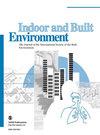Operational cost and wind power integration capacities of the integrated heat and power dispatch (IHPD) system under different heating regulation modes and time steps
IF 2.9
3区 工程技术
Q2 CONSTRUCTION & BUILDING TECHNOLOGY
引用次数: 0
Abstract
The utilization of the district heating system (DHS) thermal inertia is greatly influenced by heating regulation modes and time steps, however, which has been rarely analysed in almost all integrated heat and power dispatch system (IHPD) models, for the purpose of wind power integration. In this study, an IHPD model considering the thermal inertia of the DHS was established, in which a data interaction problem amongst the power sources, heat sources and district heating networks was solved. Thereafter, four most commonly used heating operation modes and different heating regulation time steps were applied to the IHPD model, respectively, to analyse and compare their effects on the IHPD system under different operation conditions, mainly considering the operation cost and the wind power integration. Results of the case studies showed that the variable flow and variable supply temperature mode produced the lowest operation cost of the IHPD system during a whole heating season. Consequently, this mode is recommended to be applied in the optimization operation of the IHPD system with the wind power integration. Meanwhile, a heating regulation time step within 3 h could make full use of the DHS thermal inertia, thus to improve the operational flexibility of the IHPD system.不同供热调节模式和时间步长下的热电综合调度(IHPD)系统的运行成本和风电集成能力
区域供热系统(DHS)热惯性的利用在很大程度上受到供热调节模式和时间步骤的影响,但几乎所有以风电一体化为目的的热电一体化调度系统(IHPD)模型都很少对此进行分析。本研究建立了一个考虑到区域供热系统热惯性的 IHPD 模型,其中解决了电源、热源和区域供热网络之间的数据交互问题。随后,将四种最常用的供热运行模式和不同的供热调节时间步骤分别应用到 IHPD 模型中,分析和比较了它们在不同运行条件下对 IHPD 系统的影响,主要考虑了运行成本和风电集成。案例研究结果表明,在整个采暖季期间,变流量和变供水温度模式产生的 IHPD 系统运行成本最低。因此,建议将该模式应用于风电一体化 IHPD 系统的优化运行中。同时,3 h 内的供热调节时间步长可充分利用 DHS 的热惯性,从而提高 IHPD 系统的运行灵活性。
本文章由计算机程序翻译,如有差异,请以英文原文为准。
求助全文
约1分钟内获得全文
求助全文
来源期刊

Indoor and Built Environment
环境科学-工程:环境
CiteScore
6.40
自引率
25.00%
发文量
130
审稿时长
2.6 months
期刊介绍:
Indoor and Built Environment publishes reports on any topic pertaining to the quality of the indoor and built environment, and how these might effect the health, performance, efficiency and comfort of persons living or working there. Topics range from urban infrastructure, design of buildings, and materials used to laboratory studies including building airflow simulations and health effects. This journal is a member of the Committee on Publication Ethics (COPE).
 求助内容:
求助内容: 应助结果提醒方式:
应助结果提醒方式:


